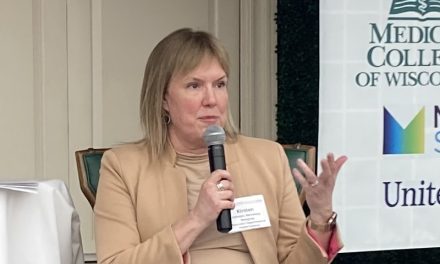
Miramont Behavioral Health leaders talk Waukesha location, growth plans

Miramont Behavioral Health in Middleton marked its three-year anniversary this month.
The 72-bed hospital, which is owned by Summit BHC, is operating at 46 beds, with 28 for adults and 18 for teenagers. It plans to add 10 more adolescent beds this fall, bringing the total number of beds to 56.
“We’re looking to grow,” CEO Dennis Gober told Wisconsin Health News. “And we have grown.”
The hospital opened an outpatient clinic in Waukesha last year and recently launched a virtual assessment program, where patients can receive a virtual screen before arriving for care. The program could in part aid with the emergency detention process, where law enforcement officers take those in crisis into custody for treatment.
Sam Zubella, director of outpatient services and head of the Waukesha clinic, and Casie Arnone, director of business development, spoke to Wisconsin Health News too.
Edited excerpts are below.
WHN: What’s been the reception of the Waukesha clinic?
Zubella: There’s been a lot of need for it and a lot of want for it. Now that we’re open, it’s starting to get people into the doors … It’s putting our name out there, letting them know that we are open for business and we are ready to serve the community.
WHN: Why did you expand into Waukesha?
Arnone: It was really due to a large community needs assessment that was performed. When we took a look at what the community truly needed in terms of patient care to support a follow-up from maybe an inpatient stay in the mental health arena, it was outpatient services. Understanding that there was a lack of those services within the southeast Wisconsin area, Summit was able to identify that that Waukesha location was clearly the best place to support the Milwaukee and southeast Wisconsin area and then also support the Middleton area.
WHN: Are there other areas you’re looking at for expansion?
Arnone: It is glaringly obvious that services are needed in the southeast Wisconsin territory. As my team and I really start to grow and expand our support for the Wisconsin market, we are looking into the Milwaukee area. We are looking even up north, into that La Crosse area where there is truly a lack of services. How can we best support that area? What’s the most convenient way that we can support the patients? That virtual assessment piece is something that we’re really proud of initiating and getting started in this last month, so that we can actually help those counties north and south of us that may have that drive to get to us.
Gober: We have a lot of providers in Wisconsin, but they are so centered around the urban areas. What we found is that some of the more rural communities are having trouble accessing a lot of services.
WHN: How is Miramont involved with the emergency detention process?
Gober: We always try to assist the crisis centers and the counties in this type of work. Some of the patients that get referred would be too acute for us at times or would not be a good mix with our population, to be honest with you. We do take involuntary patients here. (Probably) about 20 percent of our current population is involuntary. We just don’t serve Dane County and the surrounding areas. We take them from almost all the counties across the state.
(Involuntary patients) are a little bit tricky. They can come in and be discharged within 36 hours or 72 hours. Or they can be a malingerer that the county really has no place for them to go, and they utilize us as they look for that and while we look for that with them.
It is very convoluted sometimes when we’re trying to meet the differences between Rock County and a county north of here, up in the La Crosse area. Each one has their own idea of what they need. We’re trying to do our best to be able to meet those needs. Most obviously, the difficult one and the most important one is being able to communicate what’s going on with that patient and what the county feels the patient needs. Getting that alignment is the one thing that we’re really focusing on right now, and I think that we’re making progress, especially when we come to those that we’ve been in communication with or partnered with for multiple years. Sometimes things change as they evolve and we evolve. It’s been a learning experience for me. I think that the virtual assessment will eventually be a stepping stone to be able to help us and the community.
WHN: What role is the virtual assessment playing?
Zubella: That’s going to be super vital for the Waukesha clinic too and for our virtual program. Being able to have someone join virtually up north in Hayward, it’s going to be a lot better to have them do a virtual assessment and then they can just join the virtual (intensive outpatient program) with us and never have to make that long trip all the way down here just to be able to be virtual back at home. And the same thing for Waukesha — people that can join a virtual assessment, do everything there, and then any of the in-person stuff that they need to kind of finish up, they can do that at the Waukesha clinic with the staff that’s already there.
WHN: How are you grappling with workforce challenges?
Gober: We did an in-depth market analysis of what the pay scale was for our direct care people, that includes nurses and technicians. We raised our scale about 22 percent, where the top end of the scale right now is around $60 an hour for a registered nurse. So that’s one of the things that we’ve done.
People may come for the money, but they stay for the culture. One of the things that we’re really working on right now and seeing a lot of improvement on is through our employee engagement committee.
WHN: What can policymakers do to help?
Gober: Some of the initiatives that we’ve already put in place here in Wisconsin have been really good. Continuing to do any fast-tracking of nurses and also promoting nurses statewide … will take care of a large portion of that.
I would love for them to look at loan forgiveness for nurses that go into this field and be able to have some sort of stipend for that. And it’s not just for nurses at this point. It would be for therapists, (licensed clinical social workers) or anybody in the behavioral health field because of the need. If someone was able to commit to a behavioral health hospital for three years, they would get some of their loan paid back or all of their loan paid back. That would be awesome if we could partner with the state on that.
This article first appeared in the Wisconsin Health News daily email newsletter. Sign up for your free trial here.
















.jpg?bwg=1612548324)














